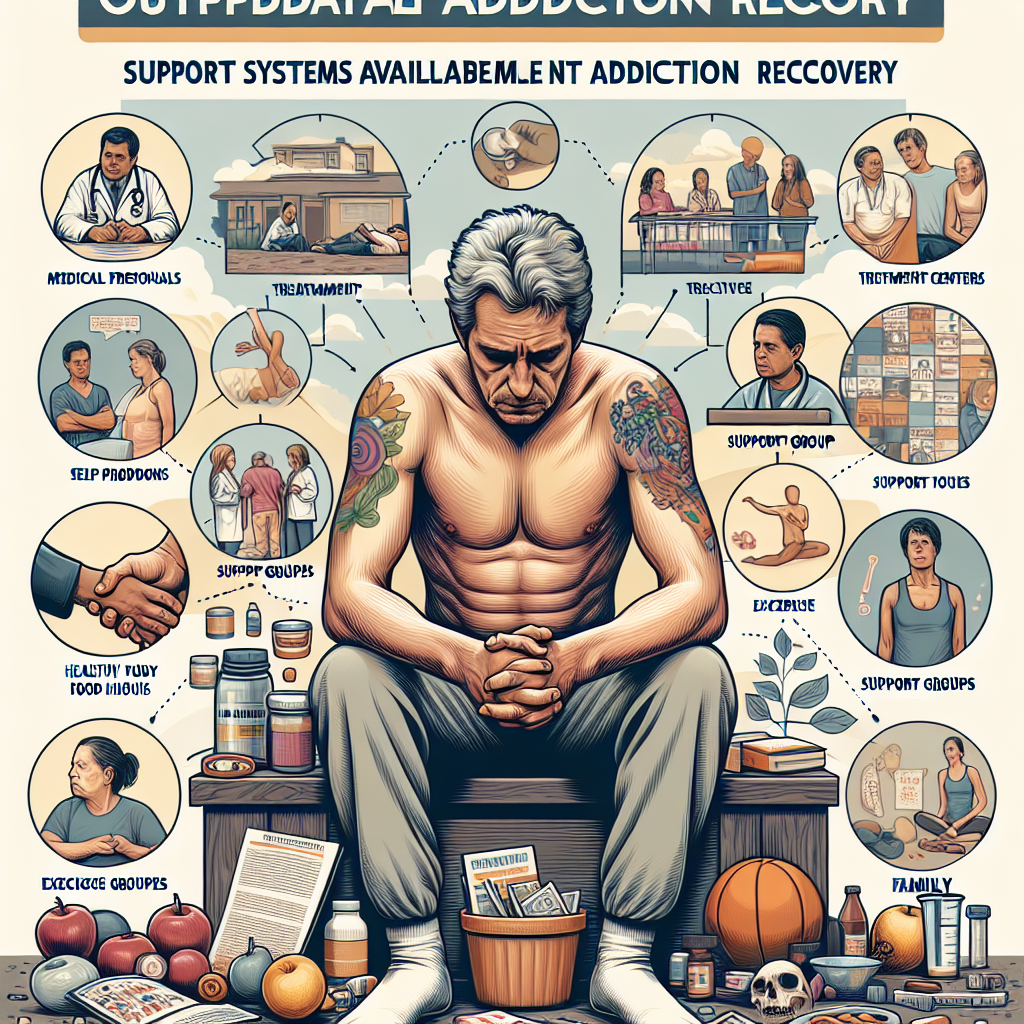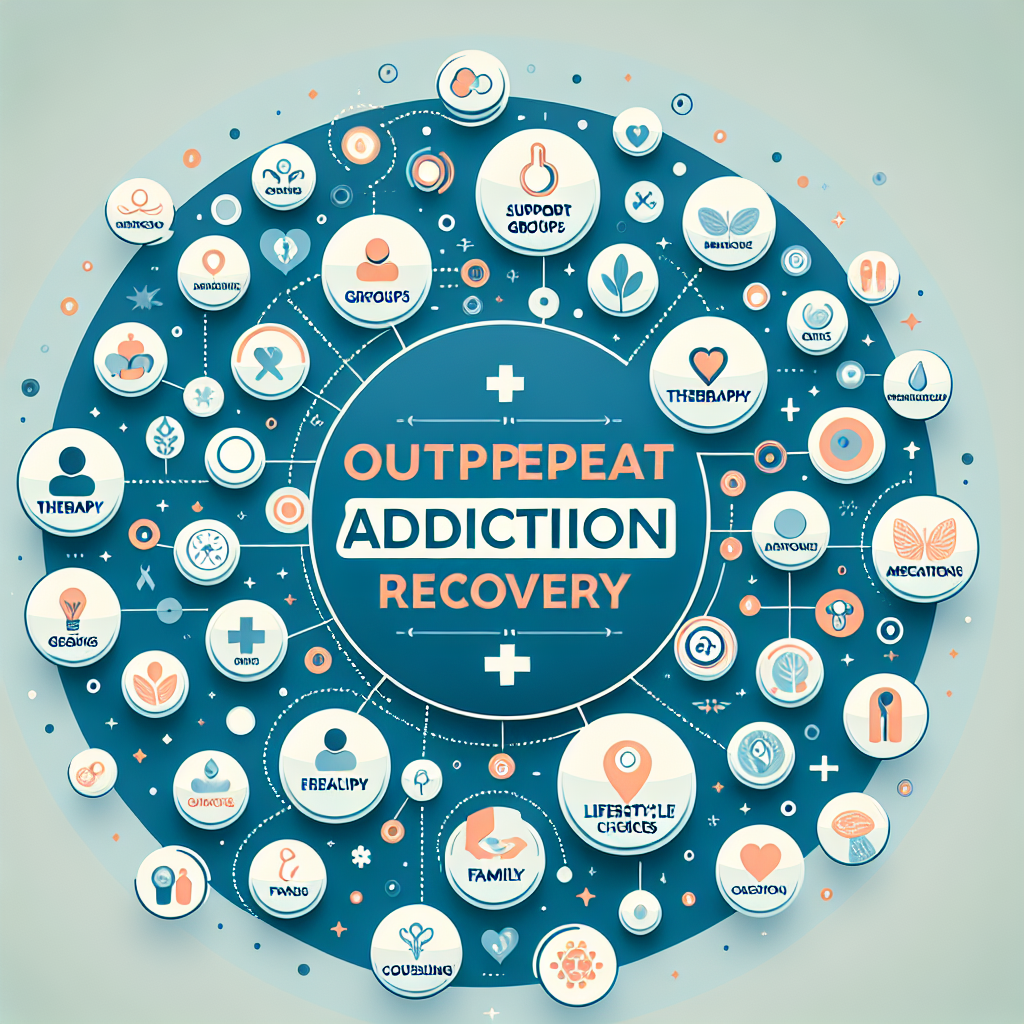-
Table of Contents

“Empowering Recovery: Comprehensive Support Systems for Outpatient Addiction Treatment”
Introduction
Outpatient addiction recovery encompasses a variety of support systems designed to help individuals overcome substance use disorders while maintaining their daily responsibilities. These support systems include individual counseling, group therapy, and family therapy, which provide emotional and psychological support. Medication-assisted treatment (MAT) is also available, combining medications with counseling to manage withdrawal symptoms and reduce cravings. Peer support groups, such as Alcoholics Anonymous (AA) and Narcotics Anonymous (NA), offer community and accountability. Additionally, outpatient programs often provide access to educational resources, vocational training, and case management services to address the broader aspects of recovery and reintegration into society. These comprehensive support systems work together to create a structured and supportive environment for individuals on their path to recovery.
Exploring Community-Based Support Systems for Outpatient Addiction Recovery
Outpatient addiction recovery can be a challenging journey, but numerous community-based support systems are available to help individuals navigate this path successfully. These support systems are designed to provide the necessary resources, encouragement, and guidance to foster long-term sobriety and overall well-being. By exploring these options, individuals can find the right combination of support that suits their unique needs and circumstances.
One of the most widely recognized support systems for outpatient addiction recovery is the 12-step program, such as Alcoholics Anonymous (AA) and Narcotics Anonymous (NA). These programs offer a structured approach to recovery, emphasizing personal accountability, spiritual growth, and mutual support. Participants attend regular meetings where they share their experiences, challenges, and successes with others who are on a similar journey. This sense of community can be incredibly empowering, as it helps individuals realize they are not alone in their struggles and that recovery is possible.
In addition to 12-step programs, there are also non-12-step support groups available for those who may not resonate with the traditional approach. Organizations like SMART Recovery and LifeRing Secular Recovery offer alternative methods that focus on self-empowerment, cognitive-behavioral techniques, and peer support. These groups provide a safe space for individuals to discuss their experiences and learn practical strategies for maintaining sobriety. By offering diverse perspectives and approaches, these programs ensure that everyone can find a support system that aligns with their beliefs and preferences.
Another crucial component of outpatient addiction recovery is professional counseling and therapy. Licensed therapists and counselors can provide individualized support, helping individuals address the underlying issues that contribute to their addiction. Cognitive-behavioral therapy (CBT), dialectical behavior therapy (DBT), and motivational interviewing are just a few of the evidence-based approaches that can be effective in treating addiction. By working with a professional, individuals can develop coping skills, build resilience, and create a personalized recovery plan that addresses their specific needs.
Moreover, many communities offer specialized outpatient treatment programs that combine various therapeutic modalities with medical support. These programs often include individual and group therapy, medication-assisted treatment (MAT), and holistic approaches such as mindfulness and yoga. By integrating multiple forms of support, these programs can address the physical, emotional, and psychological aspects of addiction, providing a comprehensive approach to recovery.
Peer support is another invaluable resource for those in outpatient addiction recovery. Peer recovery coaches and mentors are individuals who have successfully navigated their own recovery journey and are trained to support others in their process. These mentors can offer practical advice, emotional support, and encouragement, helping individuals stay motivated and focused on their goals. The shared experience of recovery creates a unique bond, fostering a sense of trust and understanding that can be incredibly beneficial.
Furthermore, family and friends play a vital role in the recovery process. Building a strong support network of loved ones who understand the challenges of addiction and are committed to providing encouragement and accountability can make a significant difference. Family therapy and support groups for loved ones, such as Al-Anon and Nar-Anon, can help families learn how to support their recovering member effectively while also addressing their own needs and concerns.
In conclusion, outpatient addiction recovery is supported by a diverse array of community-based systems that cater to different needs and preferences. From 12-step programs and alternative support groups to professional counseling, specialized treatment programs, peer support, and family involvement, there are numerous resources available to help individuals achieve and maintain sobriety. By exploring these options and finding the right combination of support, individuals can embark on a transformative journey toward a healthier, more fulfilling life.
The Role of Technology in Enhancing Outpatient Addiction Recovery Support Systems
In the journey of outpatient addiction recovery, the role of technology has become increasingly significant, offering a myriad of support systems that enhance the recovery process. As individuals navigate the challenging path to sobriety, technology provides innovative tools and resources that foster connection, education, and accountability, ultimately contributing to a more robust and effective recovery experience.
One of the most impactful technological advancements in outpatient addiction recovery is the development of mobile applications designed specifically for individuals in recovery. These apps offer a range of features, from tracking sobriety milestones to providing daily motivational messages. For instance, apps like Sober Grid and WEconnect Health Management allow users to connect with a supportive community, share their progress, and access resources such as meeting locators and recovery literature. By offering a sense of community and continuous encouragement, these apps help individuals feel less isolated and more empowered in their recovery journey.
Moreover, telehealth services have revolutionized the way outpatient addiction recovery support is delivered. Through virtual counseling and therapy sessions, individuals can access professional help from the comfort of their own homes. This not only makes it easier for those with busy schedules or limited transportation options to receive the care they need but also reduces the stigma associated with seeking help. Telehealth platforms like BetterHelp and Talkspace provide confidential and convenient access to licensed therapists, ensuring that support is always within reach.
In addition to mobile apps and telehealth services, online support groups have emerged as a vital component of outpatient addiction recovery. Platforms such as SMART Recovery Online and In The Rooms offer virtual meetings and forums where individuals can share their experiences, seek advice, and offer support to others. These online communities provide a safe space for individuals to connect with peers who understand their struggles, fostering a sense of belonging and mutual encouragement. The accessibility of these groups means that support is available 24/7, catering to the diverse needs of those in recovery.
Furthermore, technology has enabled the development of wearable devices that monitor and support recovery efforts. Devices like the Soberlink alcohol monitoring system use advanced technology to track alcohol consumption and provide real-time feedback to both the individual and their support network. This level of accountability can be a powerful motivator for individuals to stay on track with their recovery goals. Additionally, fitness trackers and smartwatches can help individuals monitor their physical health, set wellness goals, and track their progress, promoting a holistic approach to recovery that encompasses both mental and physical well-being.
Educational resources available online also play a crucial role in outpatient addiction recovery. Websites like Recovery.org and the Substance Abuse and Mental Health Services Administration (SAMHSA) offer a wealth of information on addiction, treatment options, and coping strategies. By providing access to evidence-based knowledge, these resources empower individuals to make informed decisions about their recovery and develop effective strategies for managing triggers and preventing relapse.
In conclusion, the integration of technology into outpatient addiction recovery support systems has created a dynamic and multifaceted approach to sobriety. Through mobile apps, telehealth services, online support groups, wearable devices, and educational resources, technology offers individuals the tools they need to navigate their recovery journey with confidence and resilience. As these technological advancements continue to evolve, they hold the promise of further enhancing the support available to those striving for a life free from addiction, inspiring hope and fostering lasting change.
Q&A
1. **Question:** What types of counseling are available for outpatient addiction recovery?
**Answer:** Outpatient addiction recovery often includes individual therapy, group therapy, and family counseling to address the psychological aspects of addiction.
2. **Question:** Are there any community-based support groups for outpatient addiction recovery?
**Answer:** Yes, community-based support groups such as Alcoholics Anonymous (AA), Narcotics Anonymous (NA), and SMART Recovery provide peer support and accountability for individuals in outpatient addiction recovery.
Conclusion
Support systems available for outpatient addiction recovery include individual counseling, group therapy, 12-step programs (such as Alcoholics Anonymous and Narcotics Anonymous), medication-assisted treatment (MAT), family therapy, peer support groups, and online resources. These systems provide a comprehensive network of support to help individuals maintain sobriety, address underlying issues, and build a healthier lifestyle.



